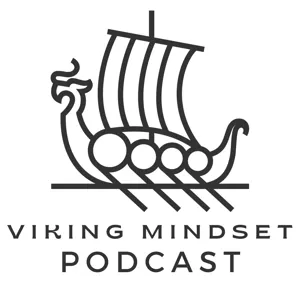Episode 74 – Podcast Season 2 Episode 22 (74): The 1st episode in a 10 Episode Series "The Boundary Blueprint: The Fundamentals of Personal Boundaries"

All information presented here on the Viking Mindset Podcast is for educational purposes only. Nothing heard here should be considered as a substitute for professional help if needed. In this episode, which is the 1st in a 10-episode series on the subject of personal boundaries titled “The Boundary Blueprint” I discuss " The Fundamentals of Personal Boundaries." Let’s dive in.
This is the inaugural episode of our hopefully enlightening 10-episode series entirely devoted to unraveling the intricate tapestry of personal boundaries. Today, we begin this series on a quest to comprehend one of the most pivotal aspects of human interaction and mental health: the essence, establishment, and enforcement of personal boundaries.
As we begin, it's crucial to understand what personal boundaries represent. In essence, personal boundaries are the invisible lines we draw around ourselves to protect our sense of self-identity and personal space. These boundaries dictate the manner in which we wish to be treated by others, the types of behaviors we accept, and those we refuse, delineating a clear demarcation between ourselves and the external world. Think of them as guidelines, rules, or limits that a person identifies as reasonable, safe, and permissible ways for others to behave towards them, and how they will respond when those limits are crossed.
But why are personal boundaries so vital? The significance of personal boundaries extends far beyond the mere delineation of personal space; they are fundamental to our mental health, serving as the foundation for building healthy, respectful relationships. Personal boundaries empower us to safeguard our emotional well-being, ensure mutual respect in our interactions, and foster a sense of autonomy and self-respect. They enable us to communicate our needs and desires clearly and concisely, reducing misunderstandings and conflicts while enhancing our connections with others.
The landscape of personal boundaries is vast and varied, encompassing several distinct types, each with its unique significance and challenges. These include emotional boundaries, which protect our feelings and emotional energy; physical boundaries, which safeguard our personal space and body; intellectual boundaries, which respect our thoughts and ideas; and spiritual boundaries, which honor our beliefs and values. Navigating these different types of boundaries is crucial to building and maintaining healthy relationships, both with ourselves and with others.
Our episode today is not just an academic exercise; it is a deeply personal exploration into the core of our interpersonal dynamics. By understanding and respecting personal boundaries, we foster environments where trust, respect, and empathy flourish. This series is dedicated to all those who seek to strengthen their relationships, enhance their emotional well-being, and live authentically within the sphere of their personal values and convictions.
In today’s episode, we aim to lay the foundation for this series by covering the fundamentals of personal boundaries. We will delve into the importance of boundaries for mental health and relationship dynamics, explore the different types of personal boundaries, and discuss the historical and psychological perspectives that have shaped our understanding of this critical concept. My goal is to equip my listeners with the knowledge and tools necessary to establish, communicate, and maintain your boundaries, thus enabling you to navigate the complexities of interpersonal relationships with grace and confidence.